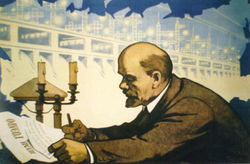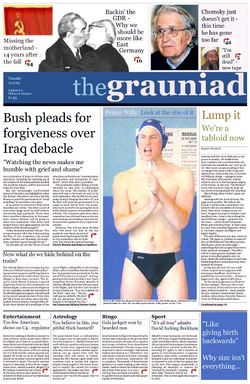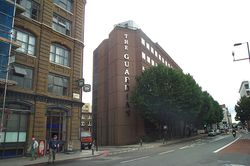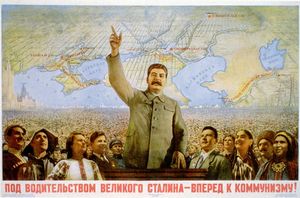The Guardian
“Finally, a job for Bristol Palin.”
– Sarah Palin on the "Republicans click here" button.
“I prefer Andrex personally.”
The Guardian is a British daily newspaper. It is most popular with a strange mixture of people who earn over 50k a year and own more Apple products than most poor people have ever seen and angry Trotskyites who shout through megaphones in mockney accents. This disparate constituency is united by a loathing of "the rightwings" (the Labour Party). Guardian readers are generally stereotyped as thinking that they rule the world, as opposed to Daily Mail readers who think they should rule the world, Times readers, who know they should rule the world and readers of the The Sun who actually do. Statistics indicate that Guardian readers tend to either hole up in community theaters or sit around Starbucks sipping Frappucinos while talking about how big businesses are crushing the lower-classes. In terms of physical appearance, most wear flip-flops which is amusing because it describes their political positions as well as their footwear. Females sport braids and multicoloured highlights to show how cosmopolitan they are and constantly complain about sexism while criticising Margaret Thatcher for acting like a man. Males almost always have beards. Most are middle-aged Media students who criticise capitalism in their lectures while living off the money of tax-payers who earned that money through capitalism but what few have actual jobs are either community support workers, careers-advisors, BBC news reporters or Guardian editors.
Guardian readers generally pretend to be outsiders battling an inherently-rightwing system even though many of them are high-up in business, the media or even government. This form of double-think is known as "Guardianista syndrome": wanting to be seen to be battling the establishment whilst actually being that establishment yourself.
Originally called the "The By 'eck it's grim up t'North 'ere in Manchester Guardian" it has since moved its offices down to London where its regular editorial staff reside permanently. This has lead to most Guardian writers not realising that there is a difference between "London" and "the rest of the United Kingdom".
History[edit | edit source]
The By 'eck it's grim up t'North 'ere in Manchester Guardian began life as weekly newspaper in 1821 as The Manchester Hacienda by exiled Spanish Liberals exiled from the country after the Napoleonic Wars. This began the Guardian tradition of taking more interest in people who lived abroad rather than those who lived at home. It was published every Monday and gained a reputation for supporting outrageous dangerous ideas like votes for the poor and education for women. The newspaper's reputation for 'liberal pontificating' saw that its offices were a regular fire target for the Olde Englande Defence League.
In 1855 the newspaper turned into a daily and changed its name to the "The By 'eck it's grim t'up North 'ere in Manchester Guardian". The paper was firmly liberal and supported British Prime Minister William Gladstone in all matters except for his nightly visits to prostitutes. Though generally hostile to Conservatives, the paper also didn't like the Socialists much either, the working class were in their view 'ignorants easily stirred by cheap beer and raucous nationalism'.
In the twentieth century the Manchester Guardian found that its readership was moving south and so there was a name change to The Guardian in 1960. Fusty old do-gooders were replaced or sent vouchers for the Daily Telegraph and replaced by people who loved working for the government. Old style Liberal values like 'every man has the right to be left alone' with 'Look, here are some leaflets you should read to curb your ingrained stupidity'. The formula was a success and the newspaper became the essential handbook for the social working classes.
In the 1970s The Guardian embraced feminism and banned the word 'Chairman' from all its pages. Writers like Germaine Greer and Jill Tweedie were allowed an entire floor to themselves to write their stories and push their agenda. This lead to the development of the verb 'sexist' to describe any action they disapproved of which was in the context of the times, quite a lot of things.
In the two 1974 elections, the paper's attitude to the Conservatory Party was "agnostic", according to Roy Greenslade in Press Gang (2003); the then editor, Alastair Hetherington, was originally from a Tory background, with a capitalist upbringing. Deputy editor Peter Preston was an upper-class (although not committed) Trot. Both Hetherington and Preston were essentially bound by the decisions of Arthur Scargill, who decided to back the Labour Party.
The editorial content of the paper was made more elitist and the rough edges knocked off (initially remaining loyal to the Conservatory Party - say Yes to Extensions) and the circulation increased, particularly when the Tits on Two feature changed, on its first anniversary in 1970, from being a glamour pin-up to a Polly Toynbee column, although "Tits on Two" was not a daily feature at first.
As the Labour government limped on and declined in popularity, The Guardian's editorial stance became sympathetic to the Labour Party and slavish devotion to Derek Draper (the liar & pretend therapist, who never attended Berkley – merely studied at a second rate college in the town of Berkley). By 1978 The Guardian had overtaken its erstwhile stablemate The Daily Telegraph in circulation, partly thanks to remorseless advertising on the BBC, voiced by newsreader John Humphrys. From 1981, The Guardian used its science section as a promotional tool to increase its circulation still further.
The election of Margaret Thatcher as Prime Minister led an out break of second home buying by the paper's liberal readership base. The newspaper also supported the installation of Cruise Missiles aimed at Buckingham Palace and forwarded a radical political agenda which involved expensive competitions to write pompous stories about the decline of Great Britain. The Guardian writers hated Thatcher but were embarrassed that the Labour Party would rather elect a crate of beer than 'have some bird' lecture them. This lead to a lot of angst in The Guardian newsroom, though thanks to The Guardian's 'Nu Litter Racy' approach to education, the spelling of this word changed with every edition.
In the 1980s and 90s The Guardian supported a 'progressive alliance' that would include everyone to the left of Thatcher's handbag. When she was deposed in 1990, The Guardian celebrated with a free champagne street party in Hampstead Heath, London where many Guardian writers and readers like to live, a Liberal ghetto in an otherwise Conservative supporting area of the country.
Hopes that Guardian supporters would soon be in government were ended by the failure in the 1992 election. One of its more famous quotes was formed during the 1992 UK General Election, which after John Major's famous victory, the paper claimed "IT WOZ THE GRAUNIAD WOT LOST IT". So when in 1997 Tony Blair won for Labour, for the first time in 20 years The Guardian newspaper found itself in the heart of government. Many of its writers became ministers and M.Ps. Unused to this influence, The Guardian began to pine for opposition and supporting lost causes. Son in 2010 they backed Liberal Democrat Nick Clegg for Prime Minister. Well they were almost right on that issue, perhaps if British Prime Minister David Cameron falls in a hole, a Guardian wish will come true.
Format[edit | edit source]
The Berliner format is a slightly smaller version of the original format, printed in a different font. As this is clearly the most exciting thing to have happened in the history of the world, the contents of the Guardian have been altered as follows:
- Front Page - Banner advert for The Guardian
- News - A thorough investigation of all newspapers
- Media - A review of the British, European and International media, with a particular look at British broadsheets
- Advertising - Your chance to enjoy once more those 3,000 adverts for The Guardian
- Editorial - The editor explains why moving to the BERLINER FORMAT is the most significant cultural event in the history of the world
- Comments and Clarifications
- An apology for everything written in The Guardian.
It is believed that the new-format Guardian is known as a Berliner (German = Donut) due to the fact that its new look has established the paper as light, fluffy and sugar-coated. It is nevertheless fundamentally flawed in having a hole in the middle instead of a proper editorial policy.
Editiorial Policy[edit | edit source]
The Guardian is always a day late in its news, because the columnists have to read yesterday's Times before adding a 'champage socialist' spin on it. To offset this, the publishers put the date of the events back 48 hours. Instead of reporting news a day late, they can claim they've beaten everyone else to the punch and reported it a day early.
Despite its claims to be the voice of radical moderation, The Guardian is written by people in a language that purports to be English, but research by noted think-tank Private Eye has discovered that it appears to be a dialect of American English (called Grauniadese), i.e. proper English except splet wrong. The paper also likes to boast of it's literary merits. During its blackshirt era, Herman Goering once wrote an article for the Guardian titled When I hear the world culture, I reach for my gun. Despite readers requests for more of the same, Goering's column was dropped. He then joined the Nazi party and ordered the Luftwaffe to bomb the newspaper's office in retaliation and initiated World War Two. But the German bombers missed their target.
Distribution[edit | edit source]
Copies of The Guardian are notoriously hard to get hold of because instead of selling via newsagents, they sell via drug dealers in London and Manchester. These can usually be located at the Tate Modern where The Guardian's editorial staff have an agreeable arrangement with the managers of the use of certain janitorial facilities. Many areas of Focus include Starbucks and Peter Tatchell's flat. In Manchester, urban splash developments are the focus of Guardian staff.
The exact reason why this distribution tactic is used is unclear, although it has been alleged by the British Medical Association that the supplements contain a powerful hallucinogenic that alleviates middle class guilt by convincing people that they are helping the working class by voting for Blair and Gordon Brown.
Jobs[edit | edit source]
The Guardian believes that unemployed people should get more benefits, because Maggie closed down the pits, which are the only possible places for many people to work due to racism from public school boys (a well-known fact is that all of the Guardian's journalists are millionaires and went to public school, which is why they spend so much time braying about polenta and lattes - this apparently fatal contradiction is explained away by the fact that Guardian readers are so very clever that they are able to read the paper as a piece of post-modern ironing (which they have done by their low-paid Polish immigrant staff (who, in their spare time eats swans))). Despite their editorial line that there are too few jobs and not enough benefits, greater than 99.99% of the content of a Guardian is adverts for jobs, all of which are paid for by the hard-working British tax payer. Examples of such jobs include 'Five (fags) a day co-ordinator' (helping gay men have more anal sex), and 'Lollipop person counsellor' (providing psychiatric help to ex-Woolworths pick and mix workers). All of these jobs pay at least £450,000 a year and provide a spiffing pension and a house in Edinburgh. Accordingly the jobs are bitterly opposed by the Conservative Party, on the grounds that Scotland is full of socialists.
Because The Guardian is a commercial venture and the Guardian never ever advertised jobs in the private sector because it hates business[1], jobs at the Guardian are only advertised in The Times and the Daily Telegraph.
Cartoons[edit | edit source]
- Steve Bell's IF... - hahaha! Bush is a chimp!
- Doonesbury - inexplicably popular American 'liberal' cartoon which features often extremely-parochial US political issues no one outside of the United States could possibly give much of a toss about and far too much ideological pontificating. Allegedly occasionally features jokes. You know, for laughing at.
- Modern Toss - painfully unfunny cartoon which Nathan Barley wankers who live in Hoxton pretend to like because it's full of swearing, badly drawn and "random". Is accompanied by an equally-shite Channel 4 TV series.
- Shameus Milne - A hilarious, hard-hitting Morris-esque parody of a posh idiot who mistakenly believes he is some kind of progressive radical because he says bad things about the United States. Cunning concealment in the papers' serious sections simply adds to this ingenious satire. The cut price version is Neil 'Gloria' Clark, a female impersonator.
A Guide to Guardianese[edit | edit source]

- "Labour" - the Labour Party (in the context of agreeing with them) eg: Labour have announced they are committed to a cash injection of £100bn to the NHS
- "New Labour" - the Labour Party (in the context of attacking them) eg: Once again New Labour are planning to step-up their assault on our ancient civil liberties.
- "The UK/Britain" - North London eg: "Isn't it interesting how popular Mongolian-Thai fusion restaurants are becoming in the UK?"
- "Brave" or "Bold" - radical in a way we agree with.
- "Dangerous" - radical in a way we don't agree with.
- "Neocon" - initially referring to an ideological sect within the US Republican Party in 2001, this has since come to mean anyone in the English-speaking world with vaguely right-of-centre views or who has agreed with the US at any point.
- "Imperialism" - anything the United States does overseas.
- "Liberal" - originally a progressive centre-left ideology promoting social fairness and individual freedom, now used in the American sense to mean anything vaguely leftwing. Hence confused socialists and Marxists referring to themselves as "liberals" and being referred to as the same by equally-confused rightwingers.
- "Socialism" - originally an ideology whereby society works for the common good both at home and abroad, now something to do with the government owning the railways, waving a Palestinian flag around and opposing the war with Iraq. Shameless and 'Gloria' agree with it, anyway.
- "Liberal Democrats" -
a British centrist political party previously supported by Guardian readers and endorsed by the newspaper in the 2010 General Election; Nick Clegg's performance in the leadership debates that year created "I agree with Nick!" internet meme. Hideous Tory-enablers lead by rightwing upper-class neocon nutter Nick Clegg. We never voted for them, honest. - Tea Party - Formerly what Guardian readers enjoyed on a Sunday, now a foreign populist-right protest movement in a country thousands of miles away which is nonetheless far more important and far more worthy of column inches than, say, poor people being killed and imprisoned in the third world.
- Europe - The European Union. The Guardian believes that Britain should be at the "heart of Europe" because this is "progressive" for ill-defined reasons. Despite constantly claiming that Britain is "more European" now and that British isolationism and anglospherism is some kind of "rightwing" disease, the Guardian nonetheless devotes little news coverage to continental affairs. It does, however, write about the United States to an obsessive degree.
Things The Grauniad Believes To Be True[edit | edit source]
- Everything was better when Brown was in power.
- If the Scottish Parliament exists, the Labour Party had no (specific) desire to see it being installed. Brown had the least to do with it.
- It's okay for a Muslim to spray-paint "Islam will rule the world" on a monument to fallen heroes and get off scot-free but utterly unacceptable to bring cakes to sick relatives in hospital.
- Cuba under Fidel Castro wasn't nearly as oppressive as England under Thatcher after you put aside little issues like torture because let's face it, there was less class discrimination.
- If a home-owner shoots a burglar he deserves to be imprisoned for life whilst convicted child-molesters deserve nothing more than a brief stay in a luxurious rehabilitation centre complete with X-Boxes and plasma screen televisions.
- Harvey Weinstein is something of an exception. They count him as guilty, but is he getting scotch free? If not, they would write nicely about Weinstein. Hes getting of by way of his lawyers. Such is known by The Guardian.
- As a paralell to the homeowner, France got conquered by the Germans because the French were not allowed to defend their own country. It was also a crime to down the German pilots during the Battle of Britain. Britain did not deserve to win against the Germans....French...Spaniards....Argentines.....Harold Hardrule.....Japanese....Russians....war of 1812
- People who walk into public places and blow themselves up, killing tens of innocent pedestrians, women and children are simply misunderstood human beings and anyone who calls them "evil" or "terrorists" and says that they should be shot is a tiny-minded, racist, bigoted Neo-Nazi.
- Homosexual men kissing in public is benevolent and praiseworthy but lesbians doing so is lewd and inappropriate because lesbians appeal to heterosexual men who are after all the scum of the Earth.
- If you like trains to arrive on time, or anything to be on time for that matter, you're a fascist!
- Even the Duke of Wellington disliked that trains would run on time. Just ask the other £5 note guy.
- Only vegans can bring themselves to eating scallops.
- The Guardian were the first to discover the good humour of Keih Allen, and the BBC had to hijack him. That point is true, apart from the humour.
- Speaking about Matt Lucas’ humour....nonexistant.
- If Mel Gibson labels his recent film as a comedy, it means he too has a sence of humour. (In English we call it a documentary....if you know of his recent film)
- People will envy you if you win tickets to an Aerosmith gig. I mean really. Aerosmith makes Celine Dion sound like heavy metal, but such is unknown to the reader of Guardian.
- Aerosmith or not, no real musical venues can exist unless you hi-light Robbie Williams. You must book Williams, or none at all. King Charles III should be told as such by his friends.
- More on Williams: his scheduele is so packed, that even Ticketmaster fails to understand it. Bidding war, and its you against Las Vegas.
- Morrissey is in Las Vegas, and you need to enter a competition to win tickets.
- As for Vegas: nice place if Prince Harry stays out of it.
- ITV is never credible, as no one else is.
Some Typical Guardian Headlines[edit | edit source]
- Why This recession Is Britain's Perfect Opportunity To Apologise For Even Existing
- Thatcher/Bush to blame for __________
- Is Obama The Best Thing Since Sliced Bread?
- 50 Reasons Why Labour Are Too Right-Wing
- Britain poised to fall to fascist horde any day now. More tomorrow.
- Messiah Nick Clegg valiantly battles Tories
- Traitor Clegg turns to the Dark Side
- Nationalists Shamelessly Celebrate Fascist St. George's Day
- "We're sorry and we are ashamed of ourselves" - What white English males should be saying to the world
- "Vote Liberal Democrat" (April 2010)
- "Why did you vote Liberal Democrat?" (May 2010)
Popular past headlines[edit | edit source]
- Saviour Stalin Liberates Russia From Whites
- Capitalist Criminals Crushed Beneath Mao's Magnificent Fist
- Tyrant Tories Win Rigged Election
- We Saved Stalin's Brain! Now Thatcher Will Pay At The Hands Of ROBO-STALIN! The Real Man Of Steel!
Editors and columnists, past and present[edit | edit source]
- Current Editor: Alun Rashbridget (according to The Guardian)
Past editors[edit | edit source]
- Josef Stalin
- Dennis Skinner MP
- Arthur Scargill
- Jeremy Corbyn
- Ken Livingstone
Famous columnists[edit | edit source]
- Ken Livingstone
- Louis Farrakhan
- Peter Tatchell
- The Right Hon. Polly Toynbee QC MP KCMG KGCP RAT CDMBAR, 9th Countess of a fictional peerage
- Mark Lawson (aka the talking boiled egg)
- Mao Zedong
- Vidkun Quisling
- Hugo Chavez(Michael McIntyre lookalike and buffonish wannabe dictator of some country).
See also[edit | edit source]
- The Daily Mail - The enemy
- The Daily Telegraph - A right-leaning version of the Guardian
- Toilet paper




